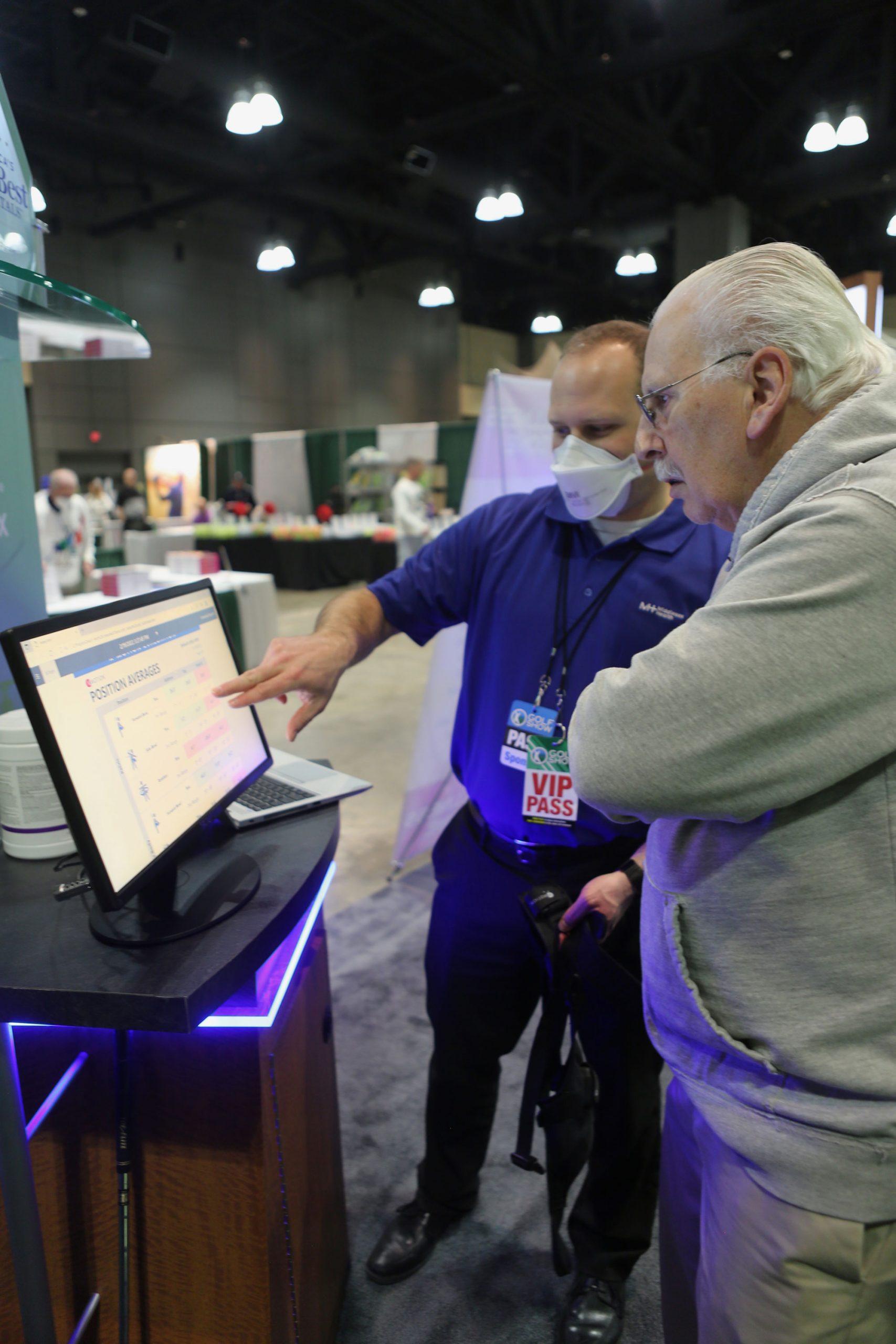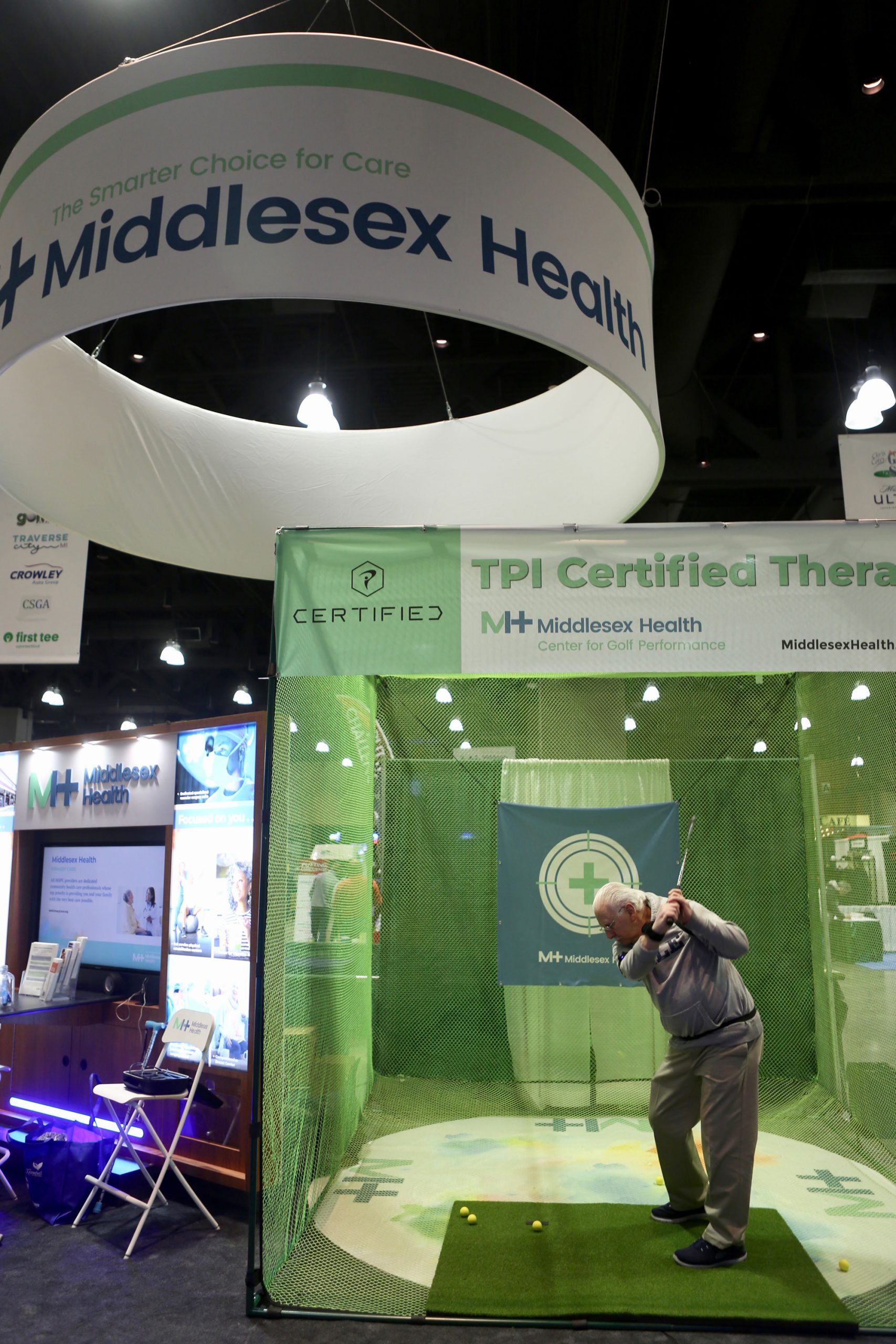Written by Alix Boyle
Photography by Todd Fairchild
Think about it: a golf swing is not the most natural movement in daily life. We don’t usually shift our hips and twist our torso while putting away the groceries.
A new program at Middlesex Health promises to analyze your swing and help you feel great and golf better while you’re out on the links.
In early 2021, Middlesex became the official healthcare provider for the Connecticut State Golf Association and the welcoming sponsor of the Connecticut Golf Show. So, the timing was perfect to begin the Middlesex Health Center for Golf Performance.
Through the Middlesex Health Center for Golf Performance, physical therapists who are Titleist Performance Institute level 1 and medical certified provide a multi-point physical assessment that focuses on specific body movements, such as body rotation and posture. They also conduct a swing analysis using a sophisticated motion device. A specialized computer program gathers key data points and then creates graphs that illustrate the efficiency of your swing.
Using this system, alongside the physical assessment, Middlesex Health physical therapists will help you learn your pain points and limitations. This data will then drive improvement plans that include follow-up sessions and at-home exercises and conditioning that are individually tailored to you. This will help as you strive to be a stronger, healthier, better golfer.
The TPI Certification program is an evidence-based, educational pathway designed to teach industry professionals how to increase player performance by understanding how the body functions during the golf swing. Brian Taber, director of physical rehabilitation at Middlesex Health, earned his doctorate in physical therapy from the MGH Institute of Health Professions. He received both his Bachelor’s and Master of Science degrees in physical therapy from UConn. And in addition to his clinical degrees, Taber has completed extensive continuing education courses and is TPI Certified.
A golfer himself, Taber is excited to offer this program as a way to help people head off injury while increasing their enjoyment of the sport. Overall, five Middlesex physical therapists are certified in this type of training.
During the COVID-19 pandemic, it seems to Taber that more people took up golf because it’s a healthy outdoor activity. However, they might not know the proper body mechanics when swinging a club.
Seasons Magazines sat down with Taber to learn all about the new Middlesex Health Center for Golf Performance. Here are some excerpts from the interview.
Q: How is golf swing analysis different from regular physical therapy?
A: If you’re injured, your doctor will prescribe physical therapy focusing on a specific injury or ailment.
The Middlesex Health Center for Golf Performance is a little different than regular physical therapy. The Titleist Performance Institute has put together the gold standard for how to screen and assess people who play golf and how their body movements can impact their swing. Maybe the golfer is tight or has discomfort with their swing.
If we put these two pieces together– the Titleist training and a practitioner with years of physical therapy experience—we can help people have a more successful and enjoyable golf experience.
Q: Can you describe the program?
A: The first visit is a 90-minute assessment. Golfers bring a club with them, usually one of the irons. The first part will be a conversation about goals and challenges. Then, we go right into a 16-point screening of body mechanics, posture, and stability. We watch them swing just visually, and we set them up with a motion analysis system that measures trunk rotation, arm movements, and hand movements. It simulates overall timing and gives us a 3D rendering of what the person looks like while they are swinging.
The focus is to look at you as a golfer and look at what those limitations are doing to your swing and how we can improve your movement before you get injured. We have an area that is dedicated to this analysis and offers enough room for participants to swing a club, allowing us to really see how they look firsthand. All five of us are avid golfers. We bring together our enjoyment of the game with the expertise to make improvements in other golfers’ games.
Q: Who is the typical client for this experience?
A: Anybody who is playing golf, whether they are brand new or play once or twice a year or play every week, can benefit. It’s for someone who wants to see an improvement in their game and who is interested in learning stretching and strengthening exercises to improve their body mechanics.
For example, say a person noticed some back discomfort during their swing. We would assess them to look at all the mechanics – including the movement of the back, shoulder, and knee. There are so many movements in golf. What portion of the swing is problematic? Is the posture off? Is the speed correct in each portion of the swing? Is the pelvis rotation delayed? What about the hip or lower trunk mobility? Is there a strength deficit leading to an incorrect pelvis movement?
We will figure out what’s leading to the discomfort. Based on the assessment, the golfer will leave with the results, and we’ll give them some type of homework like strengthening, balance, or stretching. We offer follow-up sessions that allow individuals to work one-on-one with our team so that they can work on any limitations that are identified. There’s also no age limit. We will work with teenagers up to seniors.
Q: How much does it cost?
A: The assessment is $125 for 90 minutes. The follow-up appointments are $95 each. Insurance does not cover this. If you have a true injury, you should focus on that and get it better and then come in for the golf swing assessment. Some people could get the job done in one session; others may need two to three follow-ups. We like to take time to work on goals then come back in a week or two and make adjustments.
Q: Should everyone warm up before golf?
A: Yes! Everyone should warm up before golf. When you think about the movement to produce a swing, it’s not like a normal movement you go through in everyday life. You should start out with some gentle trunk rotation and hip movements. Start small and slow and work up to a full swing.
You may also want to work on trunk and shoulder flexibility, wrist, and elbow flexibility. When you’re not playing golf, you should work on strengthening your whole body. Your ability to generate power comes from the legs and overall conditioning. People think it’s not a physical game, but realistically, if you play 18 holes and are walking, it requires overall fitness and stamina. If you’re not in shape, you’ll find you’re good for the first few holes, and then you’ll get tired. Aim for aerobic conditioning, walking for fitness, jogging, the elliptical or stationary bike, lower body and upper body strength training, and global overall fitness.
Visit MiddlesexHealth.org/tpi for more informtion.








More Stories
From Hall High to the Heart of Saint Francis: Dr. DeSimone Comes Home
Jamie Shawver, D.O.: The Modern-Day Family Doctor
Leading in Urologic Oncology: Ryan Dorin, M.D., Works on Expanding Patient Care